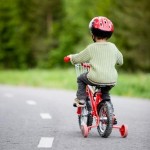Free-range or slow parenting (just like slow food), refers to parents who try to give their kids more independence—those who step back and let their kids learn from experience. Free-range parenting is based on the notion “that we can give our children the same kind of freedom we had [as kids] without going nuts with worry”. The idea is to “Prepare the child for the road, not the road for the child.”
Many parents have interpreted “free-range” to mean completely hands-off. But Skenazy says that’s not what free-range parenting is about. It is a decision to give your child freedom and responsibility while preparing him for it.
Slow parents give their children plenty of time and space to explore the world on their own terms. They keep the family schedule under control so that everyone has enough downtime to rest, reflect and just hang out together. They accept that bending over backwards to give children the best of everything may not always be the best policy. Slow parenting means allowing our children to work out who they are rather than what we want them to be.
Origins
It was unofficially launched by New York journalist Lenore Skenazy who started a controvery when she wrote in an editorial that she let her 9-year-old ride the subway alone. Lenore Skenazy and her multitude of followers think that allowing children to take on more independence teaches them valuable life skills, instills confidence, and can actually improve their academic performance.
The Rise of Fast Parenting
In the past century, all aspects of our life- work, food, sex, sports, relationships- have sped up and parenting is no exception. Carl Honoré, chronicler of the Slow Movement, argues that we have become hurried caregivers because of a convergence of issues:
- Globalization means more competition and a perceived increase in workplace uncertainty for our offspring.
- Consumer culture has led to higher expectations for “perfect teeth, perfect hair, a perfect body, perfect vacations, a perfect home – and perfect children to round off the portrait”.
- Smaller families means more time and money to spend on each child.
- Older parents have had more time in the workplace before having kids and therefore, they tend to professionalize parenting.
The Problem with Fast Parenting
As more families had both parents working outside the home, supervised after-school activities became increasingly necessary. What resulted was a shift in our culture that requires kids to be under constant adult surveillance.
Richard Gallagher, PhD, associate professor of child and adolescent psychiatry at the NYU Child Study Center says the heavy emphasis on scheduling and supervision has caused children to lose the ability to entertain themselves without TV, computers, or video games.
The Benefit of Slow Parenting and Free-range parenting
Good parents today, we seem to feel, carefully plan their children’s lives in an effort to prepare them for the future. The question is: How much is doing too much for our kids?
But the truth is that self-esteem comes from attempting something that’s a little difficult and either succeeding or failing and trying again until you do succeed.
When parents do provide their kids with more responsibility, kids mature more quickly and I do think that they feel more accomplished.
How to be a Free-ranger
The key to be an effective free-ranger is making sure that the activities your children engage in on their own are appropriate given their age and skill level.
Gallagher suggests that parents ask themselves the following questions before allowing their children to venture off on their own:
1.Does my child have the disposition to handle the activity?
2.Can he or she follow rules?
3.Does my child know what to do in case there is a problem?
4.Does my child know from whom it is safe to ask for help?
5.Does my child have a sense of how to reach out to parents, use a phone, distinguish between police officers and other people?
The bottom line, Gallagher says, is that any extreme with regard to parenting is inappropriate. Parenting is really a question of balance; balancing the amount of supervision kids have and giving them some freedom to try new things.
“Let them face some consequences of their own actions that won’t harm them, but will teach them some lessons,” Gallagher says.
Source:
http://www.webmd.com/parenting/features/free-range-parenting
http://faircompanies.com/blogs/view/slow-free-range-idle-parents-can-increase-iq-and-happiness/
http://www.mountainx.com/article/30215/Edgy-Mama-Helicopter-vs.-free-range-parenting-or-somewhere-in-between

